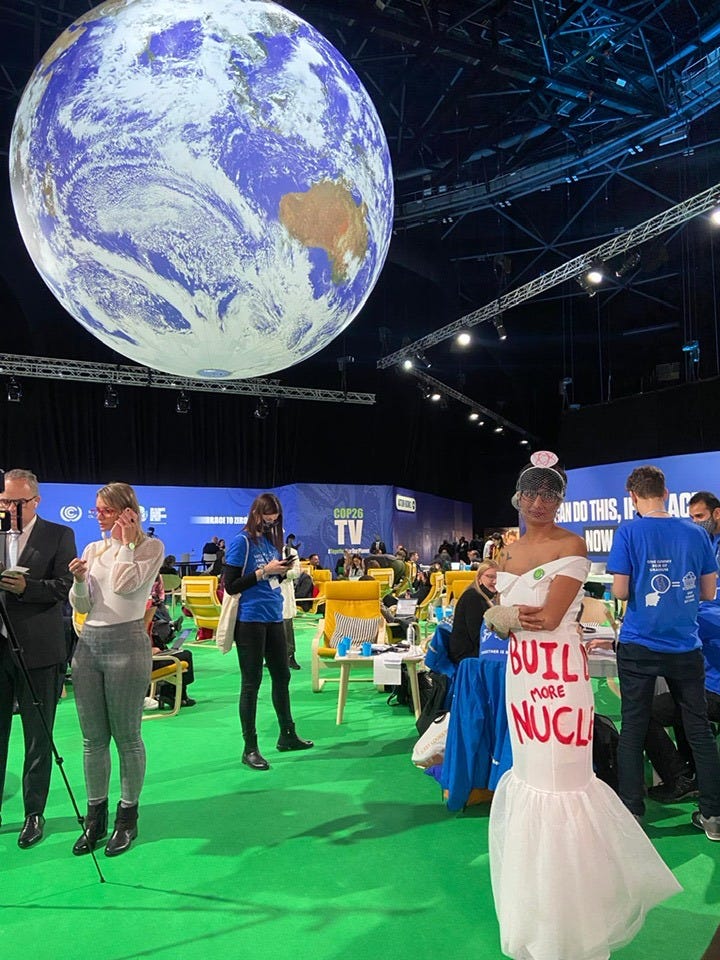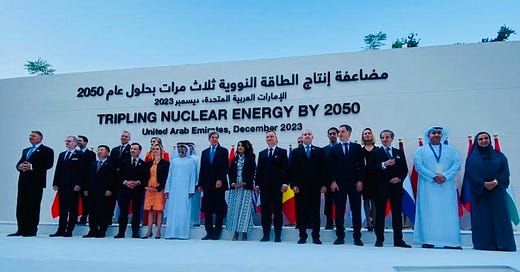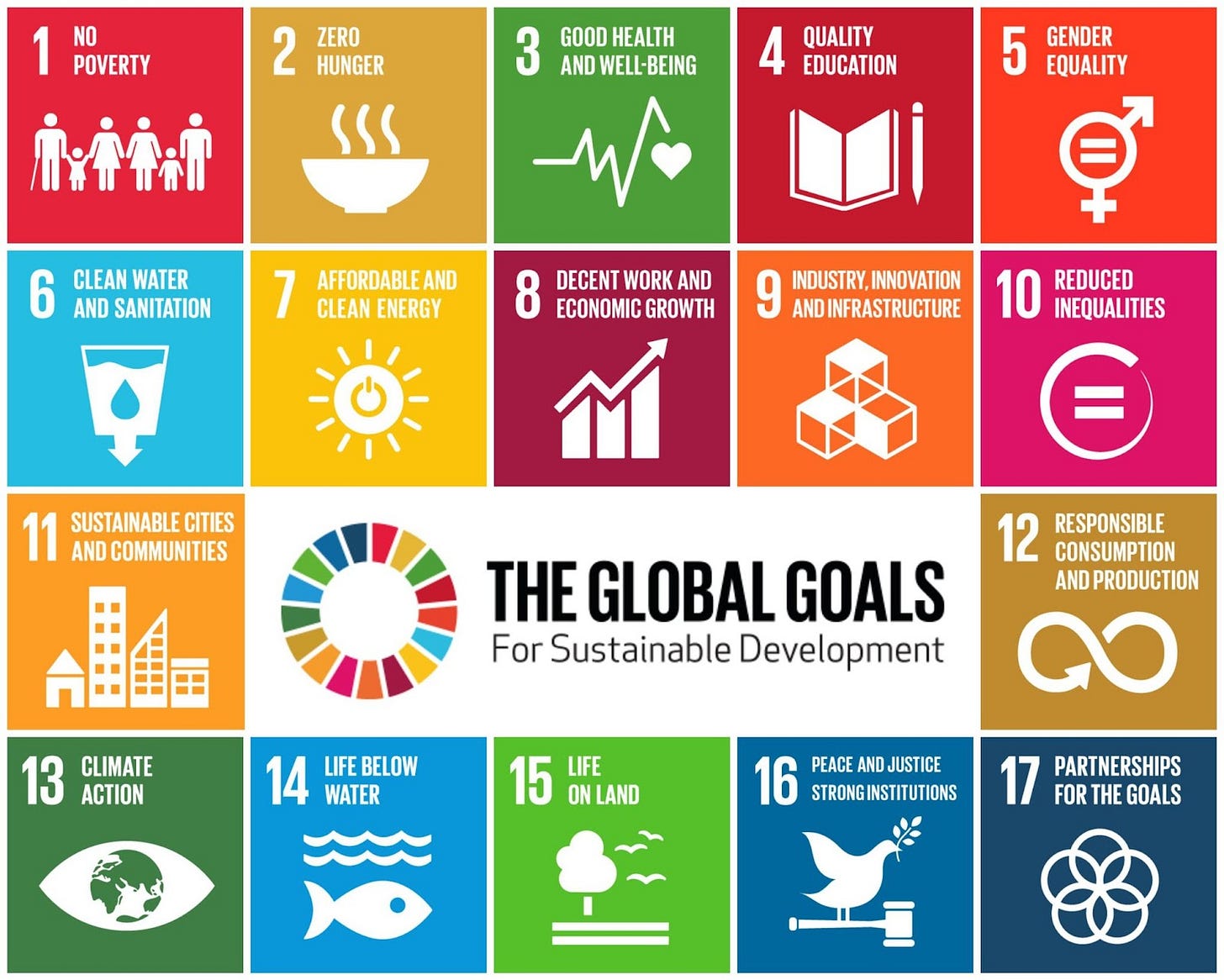People often argue that the annual Conference of the Parties (COP) to the UN Framework Convention on Climate Change is a waste of time. The conferences have been going since 1995 and many of those in attendance feel that too little has been achieved. But during the 28th COP, something significant has happened to challenge this.
This week at COP28 in Dubai marks a historic moment for nuclear energy, as over 20 countries have signed a declaration to triple nuclear capacity. The Declaration to Triple Nuclear Energy “recognizes the key role of nuclear energy in achieving global net-zero greenhouse gas emissions by 2050 and keeping the 1.5-degree goal within reach.” The declaration also points out that nuclear energy benefits energy security, has a small land footprint, and outlines that “analysis from the Intergovernmental Panel on Climate Change shows nuclear energy approximately tripling its global installed electrical capacity from 2020 to 2050 in the average 1.5°C scenario”.
Although it’s only a start, this is the strongest climate commitment I’ve seen come out of the COPs. Several years ago when I started speaking up in favour of nuclear energy, it was still seen as a dirty word, and many politicians, journalists, and activists were hesitant to support the technology publicly, even when they admitted to me that they supported it privately. I was relentlessly attacked, called a shill, and had speaking and writing slots cancelled. It was an uphill battle getting people to talk about nuclear energy in a sensible way, but the shift began to happen in many countries for the first time, and then the Russian invasion of Ukraine led to an energy crisis that propelled the conversation further forward.
Change is here
Now, it has become acceptable and cool for politicians to stand in front of a big banner that reads “Tripling nuclear energy by 2050.”

Although the declaration is not legally binding, nuclear energy finally has a seat at the climate action table. In previous years, it barely had a presence at COP. When I attended COP26 in Glasgow, there was a small area for nuclear energy in the Blue Zone, which is the formal conference and negotiation space. Although this space was meant to showcase nations’ energy achievements, even countries with a lot of nuclear energy barely mentioned it in their booths, if they mentioned it at all. The following year in Egypt, the International Atomic Energy Agency (IAEA) had a presence for the first time, with a pavilion called Atoms4Climate, and this year, Atoms4Climate pavilion is hosting even more events, and nuclear has a significant presence in The Green Zone as well – a “space where collective action can transform climate policy into concrete outcomes” – typically a space where activists have been welcomed but only of the anti-nuclear variety. Previously, there was much furore over the fact that nuclear had been actively excluded from the Green Zone. Not so in the UAE.
Also, the world’s first nuclear energy summit has just been announced, and it will be held in Brussels next year. Around 30 countries are expected to participate in the summit.
A subtle message
There is something important about the declaration that no one seems to have pointed out yet – probably because journalists are so used to covering anti-nuclear angles they haven’t spotted it.
The declaration reads that the signatories are: “Recognizing the key role of nuclear energy in achieving global net-zero greenhouse gas emissions/carbon neutrality by or around mid-century and in keeping a 1.5°C limit on temperature rise within reach and achieving Sustainable Development Goal 7.”
This is crucial because it addresses a salient point: nuclear energy is not included in any of the 17 SDGs. I took a deep dive into this a few years ago and was disappointed but not surprised to find that nuclear simple isn’t factored into the SDGs. I demonstrate in my journal paper titled The (Missing) Role of Nuclear Energy in the Sustainable Development Goals that nuclear energy is missing from the SDG table. Where better to draw attention to this oversight by the UN, who came up with the SDGs, than at a UN conference on climate change? In my paper, I set out the arguments for why SDG 7, “Affordable and clean energy”, should include nuclear energy. The new declaration at COP28 takes this a step further by sidestepping the oversight.
A critical point
Nuclear energy supplies around 10% of the world's total electricity, and fossil fuels supply around 80%. Tripling nuclear energy isn’t enough, but the loud proclamation that net zero is impossible without nuclear is crucial to the ongoing debate.
While it is still a debate in many circles, and some environmental factions still fight the deployment of clean energy, the declaration illustrates how much has changed in only a few years.
Meanwhile, President Joe Biden's climate envoy, John Kerry, addressed COP28 delegates with the following statement: "We know because the science and the reality of facts and evidence tell us that you can't get to net zero 2050 without some nuclear… These are just scientific realities. No politics involved in this, no ideology involved in this."
Science over ideology. It’s music to my ears.
The declaration is not vague about getting nuclear power plants built. It recognises the need for high-level political engagement to spur further action on nuclear power, as the signatories outline support for investment in nuclear energy “through innovative financing mechanisms”; recognises the importance of promoting resilient supply chains; argues for extending the lifetimes of nuclear power plants; and – importantly – “Call[s] on other countries to join this declaration.”
Endorsing countries include Bulgaria, Canada, Czech Republic, Finland, France, Ghana, Hungary, Japan, Republic of Korea, Moldova, Mongolia, Morocco, Netherlands, Poland, Romania, Slovakia, Slovenia, Sweden, Ukraine, United Arab Emirates, the United Kingdom, and the United States.
Notably absent from the agreement is Germany, which earlier this year closed its last three nuclear power plants. German opposition Parties have recently become vocal about the nuclear phase-out, arguing that “Nuclear power is experiencing a renaissance around the world,” and that the German government is “ignoring the signs of the times.” German politicians are also demanding that shutdown reactors should be restarted, and that more should be built.
Australia also still maintains a ban on nuclear energy – despite being a large exporter of uranium and investing in atomic submarines.
On the other hand, Japan has seen a significant shift in favour of nuclear energy in recent years, which led to the reversal of its phase-out, and Japan is a signatory of the declaration. The United Arab Emirates, where this proposal has been declared, has shown true leadership in building nuclear power plants at home. Another signatory, Poland, has announced grand plans for building nuclear power plants for the first time - after deliberating since 2005. Nuclear isn’t slow, but politics often is.
Finally, the conversation can move on from waste and cost and pivot instead towards tackling the challenges that nuclear faces, so that tripling capacity becomes easy. Once those hurdles have been jumped, we can look at tripling it again. In the words of President Emmanuel Macron at COP28, “Nuclear energy is back.” It’s about time.






Im not 100% educated on the topic, albeit well-read enough on to be dangerous to those who aren't. I must say I was quite shocked to see those words, not printed across a small banner, but permanently fastened to a wall. Feeling very encouraged by this. If we took all our blood money wasted on wars and bogus renewable energy programs (both serving only those seeking reelection) and applied it to atomic energy research, can you imagine the advancements we could make in waste disposal alone?
I'm a California native so I know how bad it can get. I know exactly why we aren't using more nuclear energy in the most populated and energy starved state in the country, and it has nothing to do with safety and protecting the environment. We have the Brown family (now the Newsoms) to thank for this and the incredible cost of living here. The nuclear industry has quite an uphill battle to fight against those idiots and their sycophants. Love that dress, by the way. Amazing!
Eventually forces of nature like physics and Zion Lights demand to assert themselves in a world that is too often delusional and uninformed. This is excellent reporting. Tipping points like this don’t happen without passionate, informed, persistent people like you. For years nuclear advocates were fighting to keep nuclear plants from closing down. There was no media coverage. The nuclear industry often left the volunteer nuclear advocates swinging in the wind, letting the economics of the situation turn off another reactor. We would not be at this moment without volunteer advocates (many of them at COP28 now) and those too few people within the industry that worked hard to get new builds going against all opposition and resistance. Now to get the US back into building again? And heal a supply chain and build a skilled workforce to get the job done everywhere. It would be nice to see the first group that filed a BS lawsuit to delay a nuclear plant build sued right back, and let the world know it’s time to build again. It seems people are up for the challenge now. This was a good day.